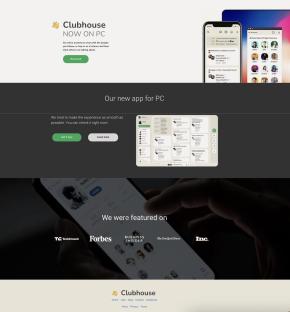Cybercriminals have taken out a number of Facebook ads masquerading as a Clubhouse app for PC users in order to target unsuspecting victims with malware, TechCrunch has learned.
TechCrunch was alerted Wednesday to Facebook ads tied to several Facebook pages impersonating Clubhouse, the drop-in audio chat app only available on iPhones. Clicking on the ad would open a fake Clubhouse website, including a mocked-up screenshot of what the non-existent PC app looks like, with a download link to the malicious app.
When opened, the malicious app tries to communicate with a command and control server to obtain instructions on what to do next. One sandbox analysis of the malware showed the malicious app tried to infect the isolated machine with ransomware.
But overnight, the fake Clubhouse websites — which were hosted in Russia — went offline. In doing so, the malware also stopped working. Guardicore's Amit Serper, who tested the malware in a sandbox on Thursday, said the malware received an error from the server and did nothing more.

The fake website was set up to look like Clubhouse's real website, but featuring a malicious PC app. (Image: TechCrunch)
It's not uncommon for cybercriminals to tailor their malware campaigns to piggyback off the successes of wildly popular apps. Clubhouse reportedly topped more than 8 million global downloads to date despite an invite-only launch. That high demand prompted a scramble to reverse-engineer the app to build bootleg versions of it to evade Clubhouse's gated walls, but also government censors where the app is blocked.
Each of the Facebook pages impersonating Clubhouse only had a handful of likes, but were still active at the time of publication. When reached, Facebook wouldn't say how many account owners had clicked on the ads pointing to the fake Clubhouse websites.
At least nine ads were placed this week between Tuesday and Thursday. Several of the ads said Clubhouse “is now available for PC,” while another featured a photo of co-founders Paul Davidson and Rohan Seth. Clubhouse did not return a request for comment.
The ads have been removed from Facebook's Ad Library, but we have published a copy. It's also not clear how the ads made it through Facebook's processes in the first place.



